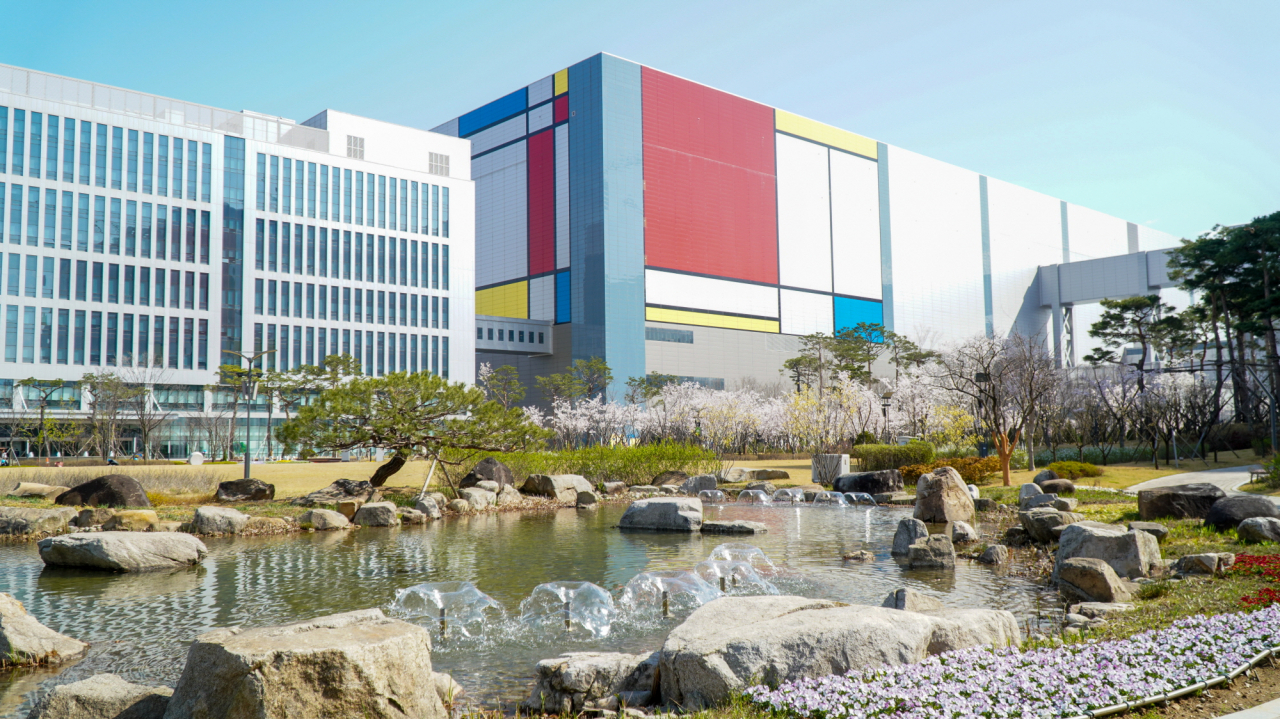Samsung Electronics declares transition to renewables, zero carbon by 2050
By Son Ji-hyoungPublished : Sept. 15, 2022 - 13:32

Samsung Electronics said Thursday it has joined the RE100 initiative to set net-zero targets by 2050 and ensure the full use of renewable energy, making a major shift in the IT devices manufacturing giant that consumed the largest amount of electricity in the world.
By pledging to use less electricity and reuse and recycle resources like plastic and water, the chips-to-consumer electronics giant aims to transition to 100 percent renewables for its operation, and at the same time become carbon neutral by reducing direct and indirect emissions and by spending more on its missions to tackle climate change.
Such green goals will be guaranteed through Samsung's participation in the RE100 initiative, supported by nearly 380 member companies including tech rivals like Apple, as well as crosstown rival SK hynix.
The belated announcement comes weeks after Samsung Electronics Vice Chairman and co-Chief Executive Officer Han Jong-hee hinted at severing its reliance on fossil fuels with "clearer goal that is also achievable" during the tech show IFA 2022 in Berlin.
Han said Samsung's delay in coal phaseout declaration was due to "some concerns about greenwashing," indicating the company needed more time to have its green plan come full circle.
But experts claimed Samsung's plan is still exposed to loopholes, as Korea's outdated power market structure pose hurdles.
“The growing corporate demand for renewables shows the urgent need for South Korea to remove structural and regulatory barriers to increase its renewable energy uptake on the grid,” noted Lim Jang-hyeok, a researcher at Seoul-based not-for-profit organization Solutions for Our Climate.
“We urge Samsung Electronics to raise its voice about the need for the government to even the playing field for renewable generators, starting with a more streamlined permitting process."
Under Samsung's blueprint, the adoption of renewable energy goals worldwide will contribute to cutting Samsung's indirect gas emissions, caused by the consumption of purchased utilities like electricity and steam.
Samsung looks to purchase renewable energy certificates and introduce green pricing methods to pay premiums to cover extra costs of acquiring renewable energy sources, among other measures. All Samsung-owned cars will run on electricity or hydrogen by 2027.
So far, the company's commitment to 100 percent renewable energy has been limited to the United States, China and Europe, while South Korea and Vietnam, which make up around 80 percent of the company’s electricity consumption, have yet to be included in the earlier commitment.
The rest of Samsung's foreign operations, as well as its mobile and home appliances division at home and abroad, will gradually transition to renewables by no later than 2027. The Vietnam operations, home to Samsung's largest smartphone manufacturing base, will adopt the full use of renewable energy by the end of this year.
Samsung also pledged to work to develop ultralow-power memory chips used in data centers and mobile handsets by 2025. Moreover, its home appliance goods, TVs and smartphones would use 30 percent less energy by 2030 compared with those produced in 2019.
In the meantime, Samsung looks to cut direct emissions, mostly stemming from gas in the process of manufacturing semiconductor chips. Moreover, Samsung plans to employ new technologies for used gas treatment, an increased use of waste heat and the introduction of electric heat sources.
On a separate note, Samsung pledged to invest 7 trillion won ($5 billion) combined to cut emissions in the chipmaking process, collecting and recycling waste electronic goods, preserving water sources and minimizing the level of pollutant released from Samsung.
The company's mobile and home appliances business under the device experience division will go carbon neutral by 2030, while its semiconductors unit will push for the net-zero goal by no later than 2050.
Samsung's chip plants will also turn to technologies to capture and store carbon, with the goal of introduction by 2030.
The tech giant has been under pressure to join the global move to combat climate change, considering the extent of energy it consumes around the world.
Solely in 2021, Samsung Electronics used 25.8 terawatt-hours of electric power and was responsible for 17 million metric tons of carbon emission.
Samsung used more electricity than Google parent Alphabet, which used 18.2 terawatt-hours of power, TSMC with 18.1 terawatt-hours of energy and Intel with 9.6 terawatt-hours of power.
Samsung Electronics was seen as one of the last leading tech companies to not have joined the group of companies committed to eventually reaching 100 percent renewable energy.
The company has also long faced scrutiny over its reliance on fossil fuels. In April, 40 global environmental organizations at home and abroad, including Solutions for Our Climate, sent a letter demanding Samsung exit from coal and set more ambitious climate goals.
Samsung Electronics did not specify when the company joined the RE100 renewables initiatives.







![[Weekender] Korean psyche untangled: Musok](http://res.heraldm.com/phpwas/restmb_idxmake.php?idx=644&simg=/content/image/2024/05/02/20240502050841_0.jpg&u=)



![[Herald Interview] ‘Time to Be Strong’ follows retired K-pop idols’ self-discovery](http://res.heraldm.com/phpwas/restmb_idxmake.php?idx=644&simg=/content/image/2024/05/03/20240503050550_0.jpg&u=)






![[Eye Interview] 'If you live to 100, you might as well be happy,' says 88-year-old bestselling essayist](http://res.heraldm.com/phpwas/restmb_idxmake.php?idx=652&simg=/content/image/2024/05/03/20240503050674_0.jpg&u=)
